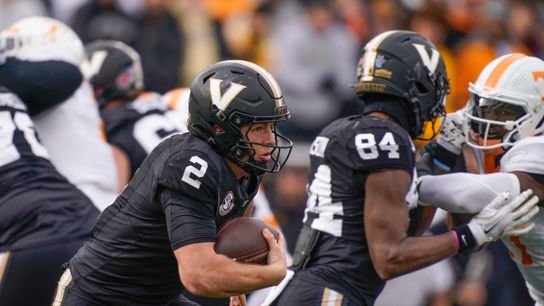The inaugural winner of the Diego Pavia Ultimate Bad Ass Award (established this year, right now, by me) is Diego Pavia. The second winner might just be... Diego Pavia. And perhaps the third.
Pavia has sued the NCAA arguing that counting the years he spent at New Mexico Military Institute toward his eligibility clock is a violation of his rights under the Sherman Act. The argument goes that, by reducing the number of years he can participate in FBS football, the NCAA also unlawfully limits the amount of time he can participate in the NIL market.
“JUCO Eligibility Limitation Bylaws restrict the ability of athletes who begin their college football careers in junior colleges from having the same opportunity to profit from NIL as students who enter an NCAA institution as freshmen,” the complaint reads.
Pavia enrolled at New Mexico Military Institute in 2020 and played two seasons there before transferring to New Mexico State in 2022. He started eight games for the Aggies in 2022, all 15 for NMSU in 2023 while winning the Conference USA Player of the Year award, and is now in the midst of his fifth college season as a graduate transfer at Vanderbilt.
If Pavia's lawsuit is successful, though, the 2024 campaign will somehow be his sophomore season. The suit asks not only for the court to grant Pavia eligibility for 2025, but for 2026 as well.
If successful, Pavia's lawsuit would have wide-ranging ramifications for college, junior college, and high school football.
Pavia is essentially asking the Middle District of Tennessee to establish junior college football as a separate entity from "regular" college football, where the years spent there do not count, thus allowing players to spend two years in juco and then enroll at a 4-year institution as true freshmen. High school recruits already have a tough enough time winning scholarship offers now with the advent of the transfer portal, but if this suit wins, they would have to compete with junior college graduates as well.
One has to wonder how the suit will be successful. It's not the NCAA's problem that the NIL market at New Mexico Military Institute was not the same as Vanderbilt, or that the NJCAA might have different NIL rules than the NCAA. (For what it's worth, the NJCAA does allow players to earn money through NIL.)
Then again, the next time the NCAA wins an NIL case in court -- or any kind of case, for that matter -- will be the first, ever since the Supreme Court ruled 9-0 against the NCAA in its landmark 2021 ruling that open the floodgates to where we are today. "The NCAA’s business model," Justice Brett Kavanaugh wrote at the time, "would be flatly illegal in almost any other industry in America."
Many in the NIL space have openly wondered when an athlete would inevitably sue to end the NCAA's 4-year limit on eligibility under the grounds of the NIL market. If and when that suit is successful, it's only a matter of time until an athlete sues a coach for denying him his constitutional NIL rights for not starting, not playing, or not offering him.
Professional sports have no eligibility limits, and so it becomes a fair question how long the NCAA can maintain its own limits if the Pavia case is successful.
If Pavia is successful, however, it's an open question whether he would even return to Vanderbilt.
“Diego is a strong leader and great player for the Vanderbilt program and I would love to have him back next year," Commodores head coach Clark Lea said. "However, I cannot leave the team and program in limbo while an extended process plays out for Diego. Unless and until Diego gets a court ruling in his favor, I must proceed with building a roster without him.”
“I would like to return to Vanderbilt next year, but need time to negotiate NIL deals before the transfer portal opens,” Pavia said in a statement through his attorneys. “If the transfer portal opens before I can complete negotiations with Anchor Impact (Vanderbilt’s collective), I will be trapped between abandoning those negotiations, or foregoing possible opportunities with other colleges who may recruit other quarterbacks out of the transfer portal before I can enter.”
Pavia has been a sensation thus far at Vanderbilt. He was instantly voted a team captain, and joined a list of 13 quarterbacks to beat Alabama and Auburn in the same season since 2004. Much of that sensation has been built around the feel-good story of a player who started his career in the junior college ranks ending in the SEC for one year and one year only.
If Pavia has his way, though, this Vanderbilt season would not be a finale, but merely an introduction to a 2- or 3-year career at the major college level -- and bring about massive changes for the rest of the sport.
